Vape Expectations – How Safe Are Legal THC Cartridges Really?
Navigating the Safety Landscape of THC Vaping
Are legal THC vape cartridges safe? This question has become increasingly important as vaping has emerged as a popular method of cannabis consumption. Here's what you need to know:
| Safety Factor | Legal THC Cartridges | Black Market Cartridges |
|---|---|---|
| Testing Requirements | Third-party lab tested for contaminants | No regulated testing |
| Primary Risks | Potential heavy metal leaching, high THC concentration | Vitamin E acetate, pesticides, unknown additives |
| Overall Safety | Generally safer with proper regulation | High risk of contamination |
| Key Precaution | Purchase only from licensed dispensaries | Avoid completely |
Vaping THC has been under intense scrutiny since the 2019 EVALI (e-cigarette or vaping product use-associated lung injury) outbreak, which hospitalized over 2,500 people and caused nearly 70 deaths. Research has shown that 82% of these cases involved THC products, with most traced to unregulated, illicit market cartridges containing vitamin E acetate as a cutting agent.
Even legal, regulated THC vape cartridges aren't without risks. A recent study presented at the American Chemical Society found toxic metal nanoparticles present in cannabis vapes before first use, with some unregulated samples containing up to 100 times more lead than regulated ones. Additionally, legal cartridges can contain THC concentrations up to 95% - dramatically higher than traditional cannabis flower at 17-18%, potentially increasing risks of dependence and adverse cognitive effects.
I'm Max Shemesh, CEO and founder of Aventus8, a company committed to providing safe, high-quality cannabinoid products in the legal hemp market where I've extensively researched are legal THC vape cartridges safe to ensure our customers receive only products that meet rigorous safety standards. My experience has shown that while regulated products are significantly safer than black market alternatives, consumers must still exercise caution and make informed choices.
Learn more about are legal thc vape cartridges safe: - weed pens - live resin carts - best battery for thc vape cartridge
Legal & Regulatory Snapshot – What Sets "Legal" Cartridges Apart
When we ask "are legal THC vape cartridges safe," we first need to understand what actually makes a cartridge "legal." The rules aren't simple – they're a patchwork that varies dramatically depending on where you live.
Legal THC cartridges come in two main varieties, and the difference matters a lot for safety:
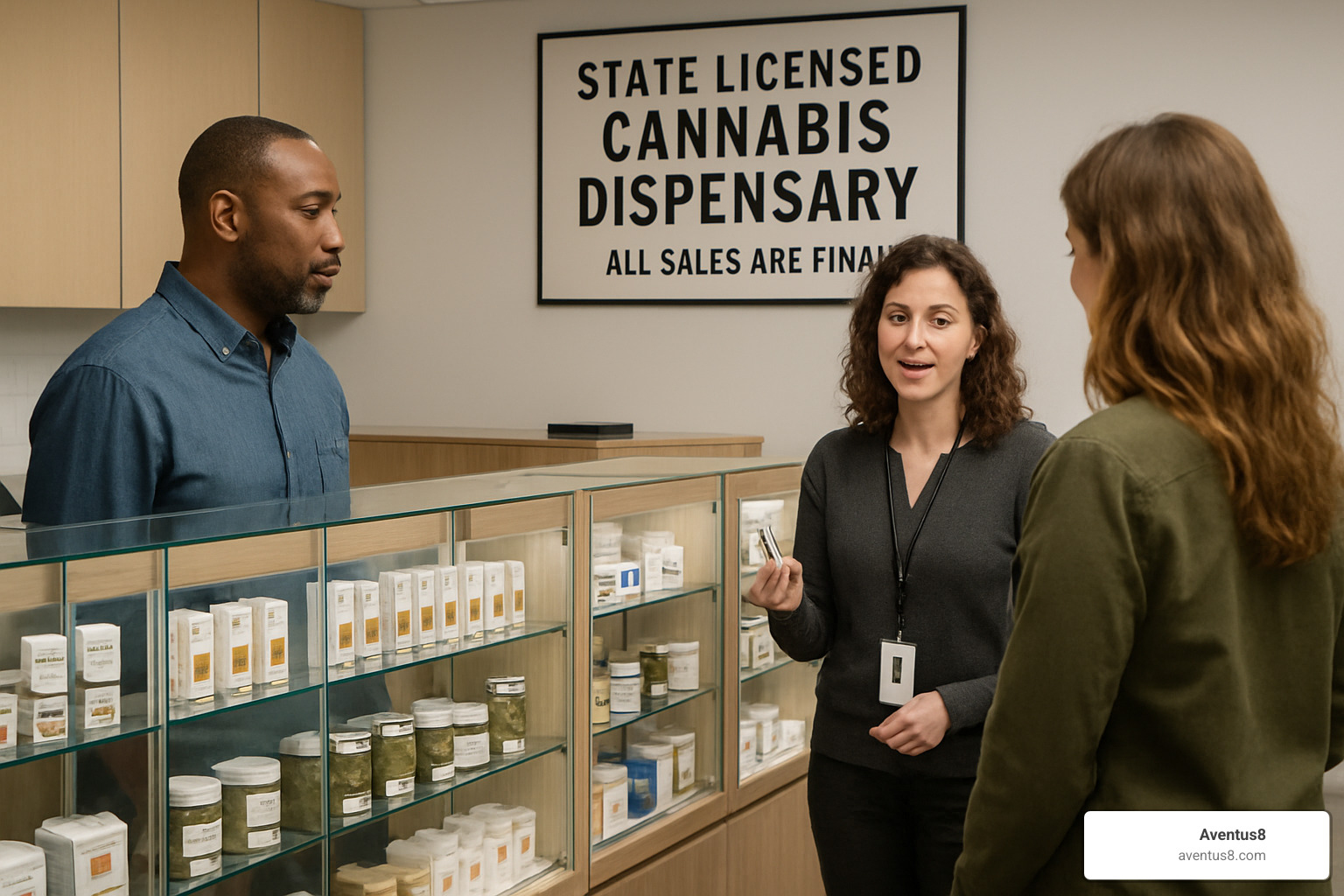
Hemp-derived cartridges operate under the 2018 Farm Bill's protection, as long as they contain no more than 0.3% delta-9 THC. These are technically legal federally, though some states have their own restrictions. These often contain alternative cannabinoids like delta-8 THC, delta-10 THC, or HHC.
Cannabis-derived cartridges with higher THC levels are only legal in states with medical or recreational marijuana programs, and they follow state-specific rules – which can be quite strict or surprisingly lenient depending on where you are.
What really separates legitimate products from sketchy ones is testing. Legal cartridges must pass a gauntlet of safety checks from independent labs that examine everything from potency to potential dangers. As one researcher put it: "Some illicit samples contained up to 100 times more lead than regulated ones, far exceeding generally accepted tolerance limits."
In the best regulated markets, every cartridge has a QR code linking to its Certificate of Analysis (COA). Scan it, and you'll see exactly what's in your product – from cannabinoid percentages to confirmation it's free from pesticides, heavy metals, solvents, and microbial contaminants.
Another hallmark of legal products is traceability. From seed to sale, regulated products are tracked at every step, creating accountability throughout the production process.
| Requirement | Legal Market | Black Market |
|---|---|---|
| Third-party testing | Required | None |
| Potency verification | Required | Unverified claims |
| Heavy metal screening | Required | None |
| Pesticide testing | Required | None |
| Child-resistant packaging | Required | Often absent |
| Batch numbers | Required | Absent |
| QR code linking to lab results | Often required | Absent |
| Age verification | Required | None |
Label Says "Legal" – Does That Guarantee Safety?
I wish I could tell you that seeing "legal" on a label means it's 100% safe, but that would be misleading. Even in regulated markets, there are gaps that smart consumers should know about.
Compliance gaps exist in every system. A JAMA study found that some legally sold products didn't match what their labels claimed – sometimes containing more THC, sometimes less, and occasionally including substances not mentioned at all.
Batch variability is another concern. Testing typically samples only a portion of a production batch. What if the tested samples happened to be the cleanest of the bunch?
Perhaps most concerning is the nano-metal contamination issue. A groundbreaking 2024 study found toxic metal nanoparticles present in cannabis vapes before they were even used – suggesting problems in how they're manufactured. The researchers noted: "Vapes from the same production lot can exhibit large variability in contamination levels."
Enforcement challenges compound these problems. Many state regulatory agencies are understaffed and overwhelmed, especially in newer cannabis markets where the rules themselves may still be evolving.
Does this mean legal products aren't safer? Not at all. The testing and standards make them dramatically safer than black market alternatives. But being an informed consumer means understanding that "legal" isn't a perfect guarantee – it's more like a significant safety upgrade that still requires some personal vigilance.
Are Legal THC Vape Cartridges Safe?
Are legal THC vape cartridges safe? This isn't a black-and-white question – the reality falls somewhere in the gray area that deserves our careful attention.
While regulated THC cartridges are undoubtedly safer than their black market counterparts, they still come with risks that every consumer should understand before taking that first puff.
One of the biggest concerns is how contaminants can become concentrated during production. When manufacturers extract and concentrate THC, they might inadvertently concentrate any pesticides or heavy metals present in the original plant material. Testing helps catch these issues, but what's considered "acceptable" varies dramatically depending on which state you're in.
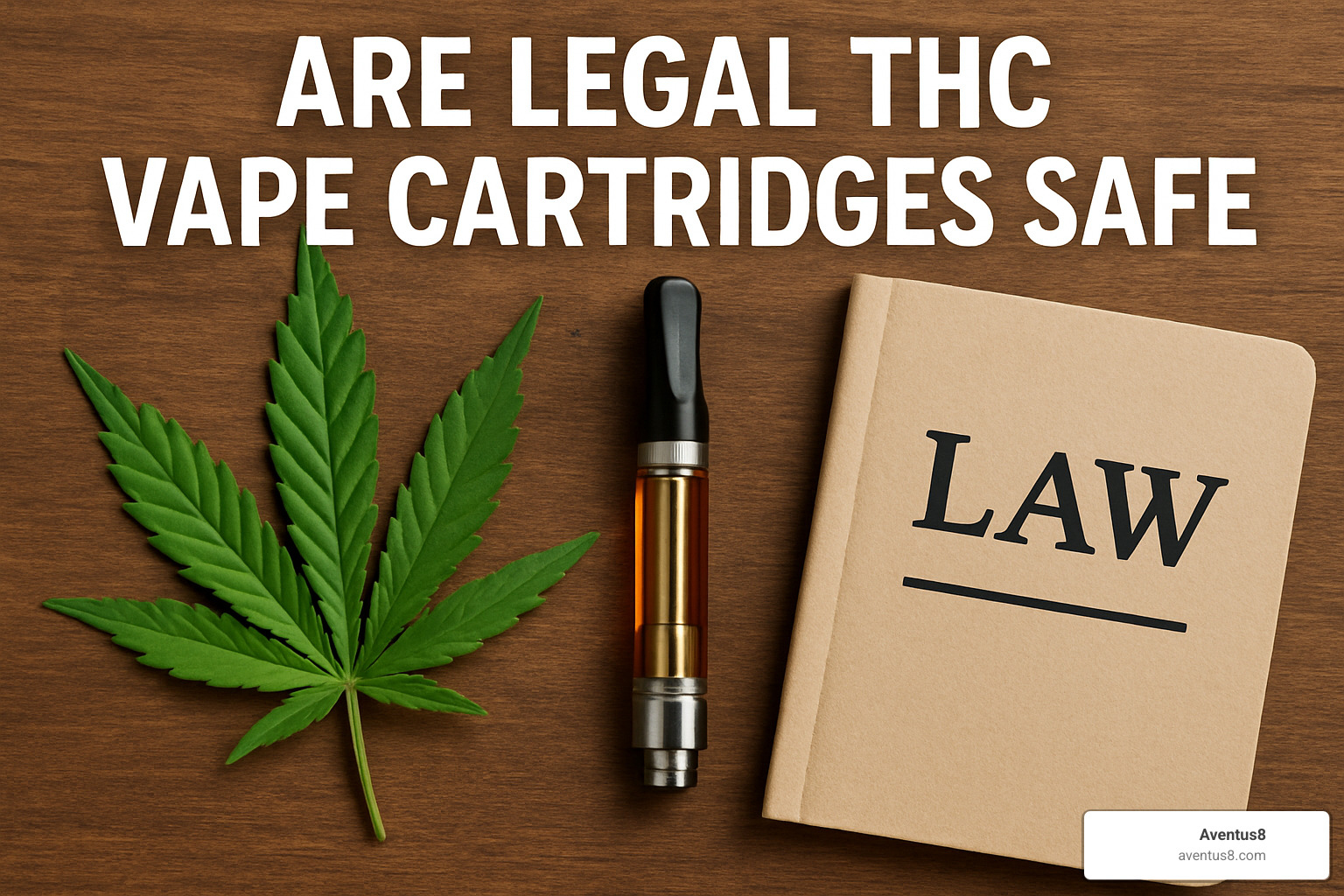
When you vape, you're inhaling tiny aerosol particles that can travel deep into your lungs. These microscopic particles might carry metals or other compounds that wouldn't be present in the same concentration if you simply smoked cannabis the traditional way. It's like the difference between sipping water versus inhaling a water mist – the delivery method changes how your body processes the substance.
Have you checked the potency of your cartridge lately? Legal products typically contain between 70-95% THC – that's astronomically higher than traditional cannabis flower, which usually hovers around 17-18%. This potency jump isn't just a stronger high; it comes with increased risks of cognitive issues, dependence, and in some vulnerable people, psychosis or uncomfortable withdrawal symptoms when you stop using.
A fascinating scientific research study on metal particles in unused vapes finded something troubling: toxic metal nanoparticles were present in brand new, unused vape liquids. The researchers compared 20 regulated and 21 illicit cannabis vapes, finding that some black market products contained up to 100 times more lead than their legal counterparts. That's a significant difference, but it also confirms that even regulated products aren't entirely free of metal contamination.
I'm particularly concerned about our younger users. Between 2013 and 2020, the number of teens vaping cannabis in the last month increased seven-fold. This trend is alarming because teenage brains are still developing and particularly vulnerable to high-potency THC's effects.
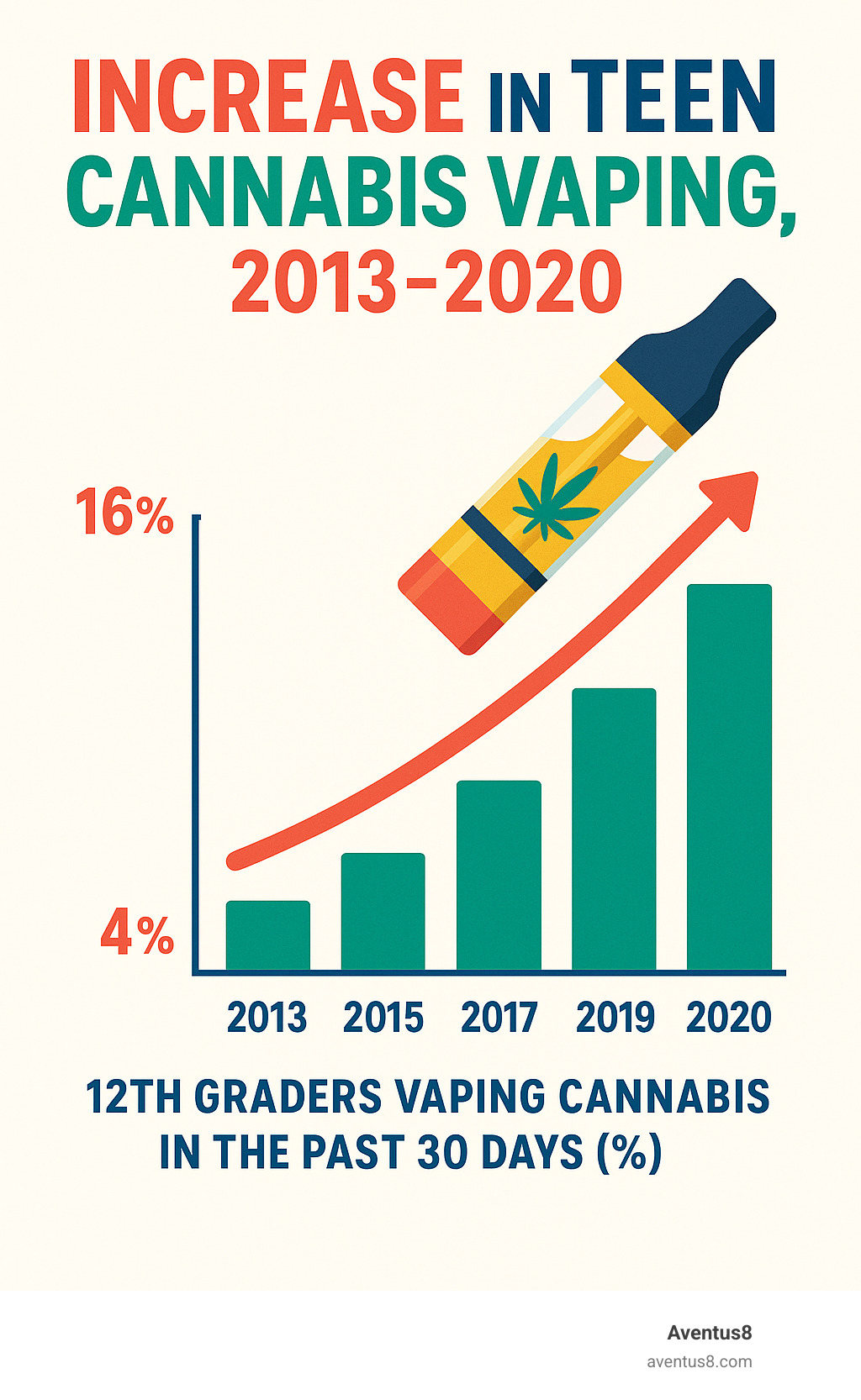
Are legal THC vape cartridges safe compared to smoking?
When we compare vaping to traditional smoking, there are some meaningful differences worth understanding:
Smoking cannabis creates tar and other byproducts of combustion that don't show up in vapor. This suggests vaping might be easier on your lungs in certain ways. When you light up a joint, you're burning cannabis at temperatures above 900°F, creating toxic compounds like ammonia, carbon monoxide, and polycyclic aromatic hydrocarbons. Vaping operates at much lower temperatures (usually 315-440°F), which likely reduces these specific toxins.
That said, both methods can produce reactive oxygen species (ROS) that may damage your lung tissue, though possibly through different mechanisms. It's like choosing between two different ways to stress your respiratory system.
A study investigating Are vaporizers a lower-risk alternative to smoking cannabis? concluded that while vaping likely reduces exposure to combustion-related toxins, it introduces its own set of risks through additives, hardware components, and higher THC delivery.
Here's something that surprised researchers: among adolescents, vaping marijuana was significantly more likely to cause symptoms of lung injury than either vaping or smoking nicotine products. This suggests there's something uniquely risky about cannabis vaping that isn't fully explained by simply avoiding combustion.
Are legal THC vape cartridges safe for long-term use?
The honest truth? We don't fully know yet. Vaping technology is relatively new, and we don't have decades-long studies tracking outcomes over users' lifetimes. But several concerns have already emerged that deserve our attention.
Chronic bronchiolitis risk is real. Repeatedly exposing your lungs to vaporized oils and additives may cause inflammation in your small airways, potentially leading to chronic bronchiolitis – a condition that can seriously impact your breathing.
Heavy-metal bioaccumulation happens gradually. The lead, nickel, and cadmium found in vape cartridges can build up in your body over time, potentially causing damage to your nervous system, heart, and kidneys. A 2018 Johns Hopkins study detected these metals leaching from vape coils into the aerosol, raising concerns about exposure even from legal products.
Psychiatric outcomes are another consideration. Regular use of high-potency THC products has been linked to increased risk of psychosis, anxiety disorders, and cannabis use disorder. About 30% of marijuana users develop some form of substance use disorder – not a small number.
Over time, your body may develop tolerance, meaning you'll need higher doses to feel the same effects. This escalation potentially increases your exposure to contaminants and adverse effects.
At Aventus8, we believe in giving you the full picture so you can make informed choices about your cannabis consumption. While legal cartridges are certainly safer than illicit ones, they still require careful consideration, especially for long-term use.
Key Health Risks & Research Findings
When it comes to THC vape cartridges, even the legal ones carry certain risks that deserve your attention. Let's dig into what researchers have finded.
Vitamin E acetate was the primary culprit behind the 2019 EVALI outbreak that sent hundreds to hospitals. While most legal markets have banned this additive, it's always worth checking that it's absent from any product you're considering. Think of it as the number one red flag to avoid.
When heated, propylene glycol (PG) – a common thinning agent in many vape products – can break down into formaldehyde and acetaldehyde. These aren't just complicated chemical names; they're actual carcinogens that could affect your long-term health.
Have you heard of "popcorn lung"? This serious and irreversible lung condition (officially called bronchiolitis obliterans) has been linked to diacetyl, a compound found in some vape flavoring agents. It got its nickname from factory workers who developed the condition after inhaling artificial butter flavoring in microwave popcorn facilities.
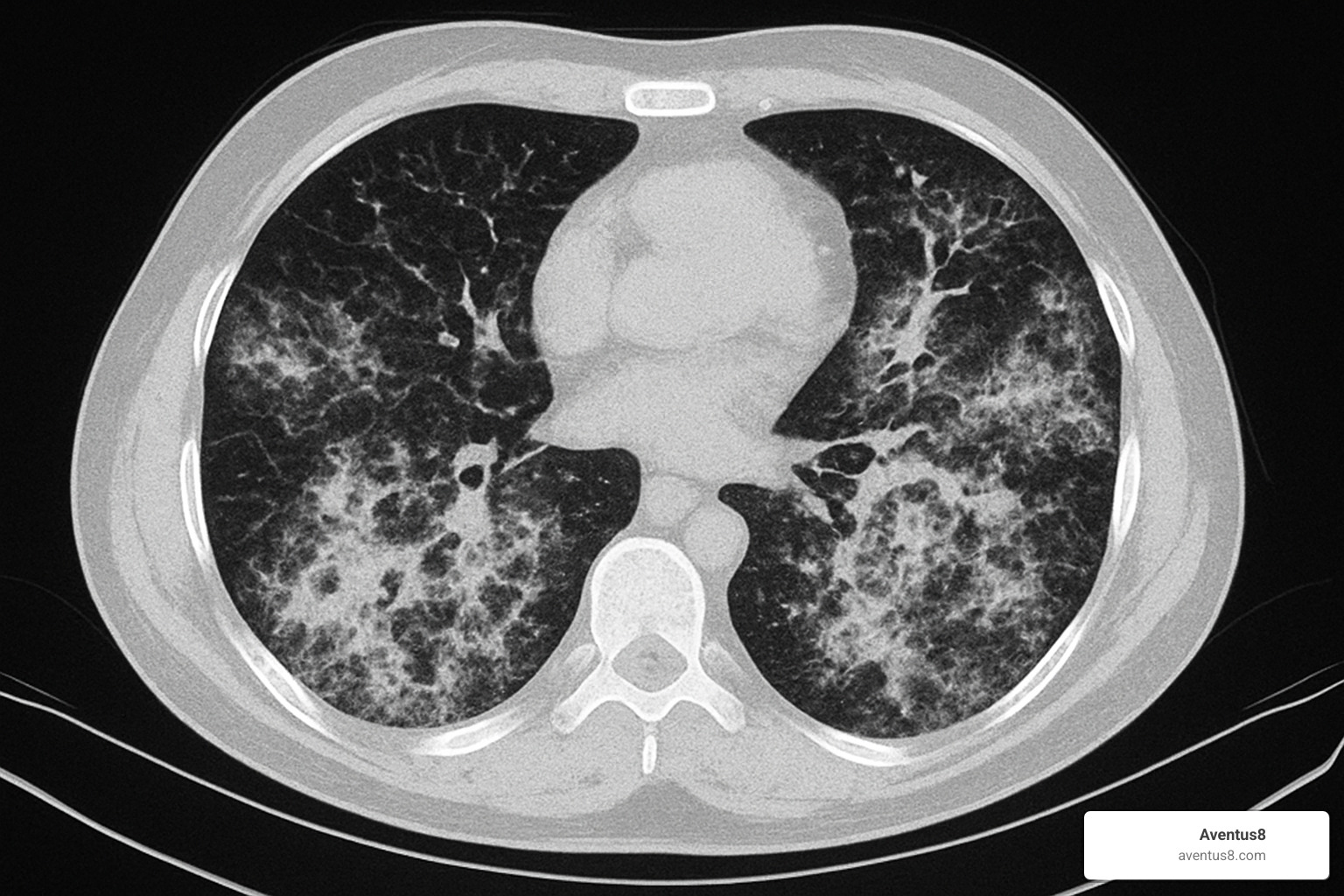
The heating elements in vape cartridges aren't entirely stable. A 2018 Johns Hopkins study found significant levels of lead and nickel leaching into the vapor produced by vape devices. These heavy metals can accumulate in your body over time, potentially leading to serious health issues.
The extraction process used to create THC oil can actually concentrate any pesticides present in the original cannabis plant. When you vaporize the oil, these concentrated pesticides enter your lungs directly – a much more direct route than if you consumed them in other ways.
Residual solvents like butane or ethanol, used during the extraction process, may remain in the final product if the purging process isn't complete. These chemicals weren't meant to be inhaled and can irritate your lungs.
Some unethical manufacturers add synthetic cannabinoids to boost potency, which can cause unpredictable and dangerous effects. Unlike natural cannabinoids, these lab-created compounds haven't been studied for long-term safety.
The statistics from the EVALI outbreak tell an important story: 82% of hospitalized cases reported using THC-containing vape products, and 33% reported exclusive THC product use. Interestingly, in states with legal recreational marijuana, there were only 1.7 EVALI cases per million people, compared to 8.8 per million in medical-only states and 8.1 per million where marijuana is prohibited. This suggests regulated markets do provide some protection, but risks certainly remain.
Can toxic metals be present before first puff?
You might think problems only start when you heat the vape, but research says otherwise. A groundbreaking 2024 study presented at the American Chemical Society found toxic metal particles present in cannabis vapes before anyone even used them.
Using advanced techniques like mass spectrometry and electron microscopy, researchers detected nano-sized particles of toxic metals in unused vape liquids. This points to contamination during manufacturing, not just from heating.
"Some unregulated cannabis vape samples contained 100 times more lead than regulated samples, far exceeding generally accepted tolerance limits," the researchers reported. That's a sobering finding for anyone concerned about what they're putting in their body.
This contamination happens in several ways. Nano-particle migration occurs when tiny metal particles move from components into the liquid during manufacturing and storage. Coil corrosion can begin even before use, as metal coils start to break down when in contact with the liquid. Manufacturing residues introduce metal particles during production.
The takeaway? Even before you apply heat – which is known to increase metal leaching – vape cartridges may already be exposing you to toxic metals.
Distillate vs Live Resin vs Full-Spectrum – Does Type Matter?
The type of THC extract in your cartridge definitely impacts both safety and experience. Let's break down the differences:
Distillate is the most refined and processed form, typically containing a whopping 85-95% THC with minimal other compounds. Its high viscosity often requires manufacturers to add thinning agents like MCT oil or terpenes, which can introduce additional risks when heated. Think of it as the "pure THC" option – potent but potentially missing beneficial compounds.
Live Resin is made from flash-frozen cannabis to preserve the plant's original terpene profile. It's less processed than distillate and contains more plant compounds. As industry experts note, "Live resin uses fresh-frozen plant material to preserve terpenes and other compounds, resulting in richer flavor and fuller effects." This preservation of natural compounds may reduce the need for potentially harmful additives.
Full-Spectrum extracts contain the full range of cannabinoids, terpenes, and flavonoids from the plant. Similar to live resin, these typically require fewer additives but contain a wider range of compounds. The entourage of natural plant compounds might provide a more balanced experience, but there's still uncertainty about how some of these compounds react when heated.
The viscosity differences between these extracts matter for safety. Thicker oils may require more powerful batteries or special cartridge designs, potentially increasing the risk of overheating and producing harmful byproducts.
From a safety perspective, products that require fewer additives and operate at lower temperatures generally present lower risks. This makes live resin and full-spectrum options potentially safer choices than heavily processed distillates that need thinning agents to work properly in a vape cartridge.
Minimising Risk: Buying, Dosing & Monitoring
Let's be honest - while are legal THC vape cartridges safe is a complex question, there are practical steps you can take to reduce your risks. Think of this as your friendly safety guide rather than a guarantee.
When shopping for cartridges, always buy from licensed dispensaries or trusted retailers like Aventus8 that prioritize comprehensive testing. Those QR codes on packaging aren't just for show - scan them to view the Certificate of Analysis (COA) that verifies what's actually in your product. This simple step can make a world of difference in your vaping experience.
Match those numbers! The batch number on your cartridge should match the one on the lab report. This isn't being overly cautious - it's ensuring the test results actually apply to what you're about to inhale.
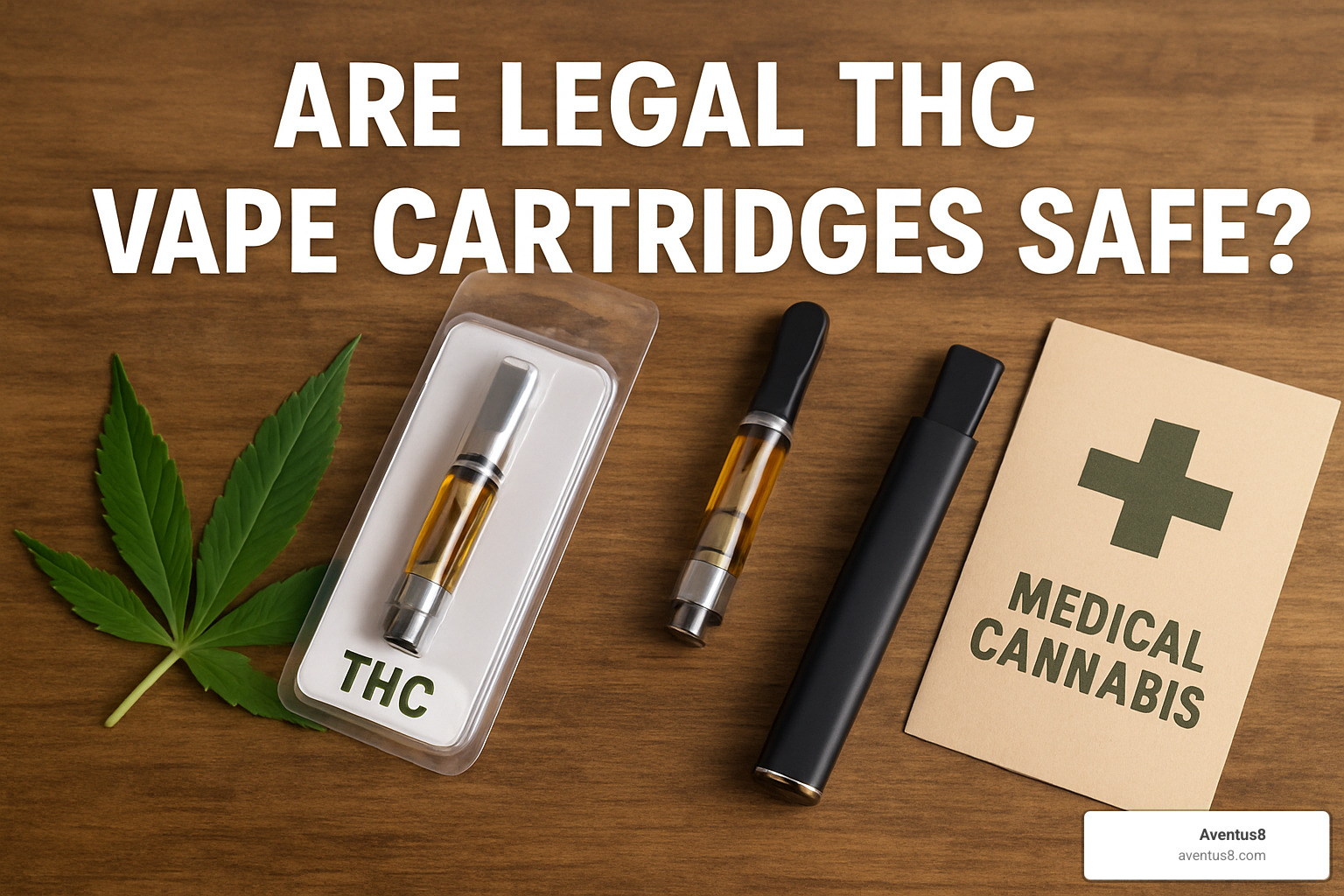
Hardware quality matters more than you might think. Ceramic coils tend to release fewer metal particles than metal coils when heated. Yes, better hardware often means spending a bit more, but your lungs might thank you later.
Keep your vape battery set to lower voltages (between 2-4V) to prevent overheating. Higher temperatures might create impressive clouds, but they also create more potentially harmful compounds. Sometimes less really is more!
The "start low, go slow" approach isn't just for beginners. Even experienced users benefit from taking a single small puff, then waiting 15-20 minutes to gauge effects before continuing. This is especially crucial with today's high-potency products that can pack a surprising punch.
Proper storage isn't just about making your cartridge last longer - it's about safety too. Keep cartridges upright at room temperature, away from direct sunlight or heat sources. Improper storage can degrade the oil and potentially increase harmful compounds over time.
Dealing with a clogged cartridge? Resist the urge to apply excessive heat or force. Instead, gently warm it (never with an open flame!) and draw slowly without power to clear the airway. A little patience goes a long way here.
Some folks should be particularly cautious about THC vaping. If you're under 25, pregnant, breastfeeding, have existing lung conditions, a personal or family history of psychosis, or take medications that might interact with cannabinoids - you might want to explore alternative consumption methods or avoid cannabis altogether.
Pay attention to your body's signals. Persistent cough, shortness of breath, chest pain, digestive issues, rapid heartbeat, or fever after vaping aren't normal and shouldn't be ignored. Your body might be telling you something important!
For deeper dives into vaping safety, check out our detailed guides on weed pens safety and disposable THC vapes.
Quick Checklist Before You Buy
Before handing over your hard-earned cash for a THC vape cartridge, run through this simple safety check:
Check the seal - Packaging should be intact without signs of tampering. This isn't just about freshness; it's about ensuring no one has added anything unexpected.
Look at the oil - Quality oil appears clear to light amber, not dark or cloudy. Discoloration can signal contamination or degradation that might affect both safety and experience.
Be price-aware - That suspiciously cheap cartridge? There's usually a reason for the discount, and it's rarely good news for your health. Quality testing costs money, and those costs are reflected in the final price.
Know your retailer - Purchase only from licensed dispensaries or reputable sellers like Aventus8 that prioritize thorough testing and transparency.
Review those lab results - Comprehensive testing should include pesticides, heavy metals, residual solvents, and microbial contaminants - not just THC potency.
Scrutinize ingredients - When it comes to additives, less is generally better. Be particularly wary of vitamin E acetate, PEG, PG, or VG, which can create harmful compounds when heated.
Hardware matters - Look for cartridges with ceramic or high-quality metal components rather than cheap plastic parts that might leach chemicals.
What to Do If Symptoms Develop After Vaping
If you experience worrying symptoms after using a THC vape cartridge, don't panic, but do take action:
First, stop using the product immediately. This might seem obvious, but many people continue using products despite early warning signs.
If you're experiencing severe symptoms like difficulty breathing, chest pain, fever, or vomiting, seek medical attention right away. Don't downplay your symptoms or feel embarrassed - be honest with healthcare providers about your vaping history so they can provide appropriate care.
Remember to report the product to your local health department and the retailer. Your report might prevent others from experiencing similar issues.
Keep the cartridge and packaging for potential testing. This evidence could be crucial for identifying exactly what caused your reaction.
For broader substance use concerns, the SAMHSA National Helpline (1-800-662-HELP) offers confidential, 24/7 information and treatment referrals. Sometimes talking to a professional can provide valuable perspective.
With vaping-related lung injuries, early intervention can make a significant difference in recovery. Your health is worth the caution - when in doubt, check it out!
Frequently Asked Questions about are legal thc vape cartridges safe
Do legal cartridges still contain vitamin E acetate?
After the devastating 2019 EVALI outbreak, most regulated markets swiftly banned vitamin E acetate in THC vape products. You'll be relieved to know that reputable manufacturers and licensed dispensaries have removed this harmful ingredient from their cartridges.
That said, the patchwork of state regulations means enforcement isn't always perfect. Some products might still slip through regulatory cracks, which is why I always recommend checking those lab reports carefully. A proper Certificate of Analysis should specifically test for vitamin E acetate and confirm it's not present.
Here at Aventus8, we take this seriously – all our products undergo rigorous testing to ensure they're completely free from vitamin E acetate and other potentially harmful cutting agents. Your safety is simply not something we're willing to compromise on.
How do state testing panels differ?
The testing landscape for cannabis products varies dramatically from state to state, creating a somewhat confusing situation for consumers:
California sets the gold standard with comprehensive requirements covering 66 different pesticides, heavy metals, mycotoxins, microbials, and residual solvents. When you buy a product tested under California's protocols, you're getting some of the most thoroughly screened vapes available.
Colorado, while still requiring testing, focuses more on residual solvents, microbials, and potency verification, with somewhat less rigorous standards for pesticide screening.
Oregon has established specific limits for pesticides, solvents, and microbiological contaminants, creating a balanced but thorough approach.
Washington requires verification of potency, moisture content, foreign matter, microbiological contaminants, mycotoxins, and residual solvents.
The practical impact of these differences? A cartridge that passes testing in one state might actually fail in another with stricter standards. For hemp-derived products (containing ≤0.3% delta-9 THC), the situation becomes even more variable since these fall under different regulatory frameworks than high-THC cannabis products.
This inconsistency is why we at Aventus8 hold all our products to the highest testing standards, regardless of the minimum requirements in any particular state.
Can I travel with a legal THC cart under 0.3%?
Traveling with hemp-derived THC cartridges remains a tricky legal gray area, even when they contain less than 0.3% delta-9 THC. Let me break it down for you:
For domestic flights, the TSA isn't actively searching for cannabis products, but if they happen to find something that looks like it contains THC, they might refer it to local law enforcement. While hemp-derived products with ≤0.3% delta-9 THC are technically legal federally, proving your cartridge meets this definition can be challenging in the moment.
When it comes to international travel, I have to be blunt: just don't do it. Many countries maintain strict anti-cannabis laws regardless of THC percentage, and the penalties can be severe – we're talking potential imprisonment in some places.
For driving across state lines, even federally legal hemp-derived products can cause headaches because individual states may have laws prohibiting certain cannabinoids (like delta-8 THC) that are commonly present in many hemp vapes.
The safest approach? Avoid traveling with any THC products, even those technically legal under federal law. If you absolutely must travel with hemp-derived products, always carry the Certificate of Analysis showing THC content and be prepared to calmly explain the legal status.
The laws around cannabis are evolving rapidly, but unevenly – what's perfectly legal in one place might result in serious consequences just across a border. When in doubt, it's better to purchase locally at your destination from a trusted source like Aventus8, where we offer fast shipping nationwide with no medical card required.
Conclusion
Are legal THC vape cartridges safe? While they're certainly safer than their black market counterparts, the truth lies somewhere in the middle. Legal products undergo testing that screens out many of the harmful contaminants and additives linked to serious health issues like EVALI – but that doesn't mean they're risk-free.
Even when you buy from licensed dispensaries, there are still some concerns worth noting. The heating elements in cartridges can leach potentially harmful metals into the vapor you inhale. Many legal products contain extremely high THC concentrations – sometimes reaching 95% – which may increase your risk of developing dependence. And the various additives used in these products? We simply don't have enough long-term research to know exactly what happens when we inhale them regularly for years.
The good news is that regulations continue to improve. Testing requirements are becoming more stringent in many markets, with more comprehensive panels looking for a wider range of contaminants. This trend toward greater oversight gives us hope, though gaps in regulation definitely remain.
For those who choose to vape THC, making informed choices is your best protection:
Purchase only from licensed, reputable sources like Aventus8, where rigorous testing standards are the norm, not the exception. Always review lab reports before buying – they're your window into what's actually in that cartridge. Use appropriate hardware at low temperatures to minimize the formation of potentially harmful compounds. And perhaps most importantly, pay attention to your body's response – if something feels off, it probably is.
Here at Aventus8, we take product safety seriously. Every item in our collection is thoroughly tested to meet or exceed regulatory requirements. We believe so strongly in providing access to legal, tested products that we offer free shipping and a free gift on orders over $75 within the U.S. – no medical card required.
It's worth remembering that research on vaping THC is still evolving. New findings emerge regularly, and staying informed about the latest safety data is part of being a responsible consumer. For more information about our selection and testing standards, explore our collection.
The bottom line? Choose tested products from reputable sources and vape responsibly. Pay attention to proper dosing, know the warning signs of adverse reactions, and never hesitate to set a product aside if something doesn't seem right. After all, your health isn't worth the risk of cutting corners.
